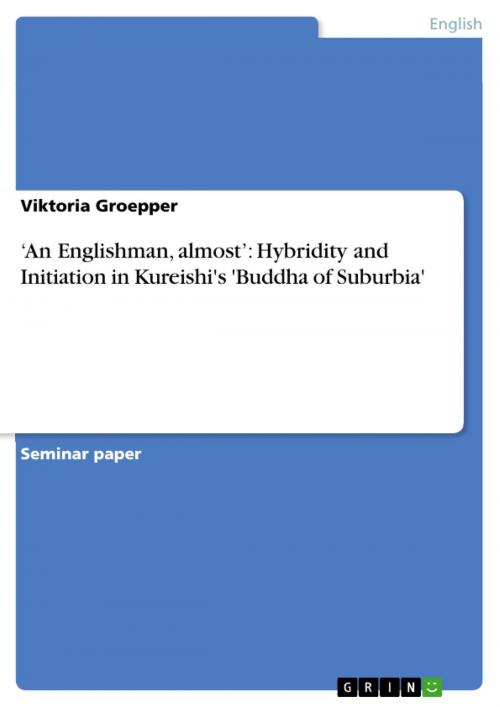'An Englishman, almost': Hybridity and Initiation in Kureishi's 'Buddha of Suburbia'
Fiction & Literature, Literary Theory & Criticism, British| Author: | Viktoria Groepper | ISBN: | 9783640631544 |
| Publisher: | GRIN Verlag | Publication: | May 27, 2010 |
| Imprint: | GRIN Verlag | Language: | English |
| Author: | Viktoria Groepper |
| ISBN: | 9783640631544 |
| Publisher: | GRIN Verlag |
| Publication: | May 27, 2010 |
| Imprint: | GRIN Verlag |
| Language: | English |
Seminar paper from the year 2009 in the subject English Language and Literature Studies - Literature, grade: 1,3, University of Regensburg (Institut für Anglistik und Amerikanistik), course: English Literature III - The 20th Century, language: English, abstract: 'My name is Karim Amir, and I am an Englishman born and bred, almost. I am often considered to be a funny kind of Englishman, a new breed as it were, having emerged from two old histories. But I don't care - Englishman I am (though not proud of it), from the South London suburbs and going somewhere. Perhaps it is the odd mixture of continents and blood, of here and there, of belonging and not, that makes me restless and easily bored. Or perhaps it was being brought up in the suburbs that did it. [...] I was looking for trouble, any kind of movement, action and sexual interest I could find, because things were so gloomy, so slow and heavy [...] it was all getting me down and I was ready for anything.' (The Buddha 3) The first lines of Kureishi's novel reveal most of what this 'utterly irreverent, wildly improper but also [...] truthful [...] and very funny' (Salman Rushdie) story will deal with: 'initiation, identity, the outsider looking in, and racial conflict. All of these issues are introduced in the first paragraph.' (Kaleta 68) Karim Amir, the son of an Indian father and a white English mother is the protagonist and narrator of the novel The Buddha of Suburbia. First published in 1990, the novel is considered to be Hanif Kureishi's most successful novel. It combines the two genres 'Bildungsroman' and 'Condition of England' novel. Both are typical for the 19th century, but Kureishi successfully combines them both and brings them into a contemporary setting. (Bentley 161) The term 'Bildungsroman' was coined by the German philologist Johann Morgenstern and arose during the German Enlightenment, presenting the psychological, moral and social shaping of a usually young protagonist...
Seminar paper from the year 2009 in the subject English Language and Literature Studies - Literature, grade: 1,3, University of Regensburg (Institut für Anglistik und Amerikanistik), course: English Literature III - The 20th Century, language: English, abstract: 'My name is Karim Amir, and I am an Englishman born and bred, almost. I am often considered to be a funny kind of Englishman, a new breed as it were, having emerged from two old histories. But I don't care - Englishman I am (though not proud of it), from the South London suburbs and going somewhere. Perhaps it is the odd mixture of continents and blood, of here and there, of belonging and not, that makes me restless and easily bored. Or perhaps it was being brought up in the suburbs that did it. [...] I was looking for trouble, any kind of movement, action and sexual interest I could find, because things were so gloomy, so slow and heavy [...] it was all getting me down and I was ready for anything.' (The Buddha 3) The first lines of Kureishi's novel reveal most of what this 'utterly irreverent, wildly improper but also [...] truthful [...] and very funny' (Salman Rushdie) story will deal with: 'initiation, identity, the outsider looking in, and racial conflict. All of these issues are introduced in the first paragraph.' (Kaleta 68) Karim Amir, the son of an Indian father and a white English mother is the protagonist and narrator of the novel The Buddha of Suburbia. First published in 1990, the novel is considered to be Hanif Kureishi's most successful novel. It combines the two genres 'Bildungsroman' and 'Condition of England' novel. Both are typical for the 19th century, but Kureishi successfully combines them both and brings them into a contemporary setting. (Bentley 161) The term 'Bildungsroman' was coined by the German philologist Johann Morgenstern and arose during the German Enlightenment, presenting the psychological, moral and social shaping of a usually young protagonist...















